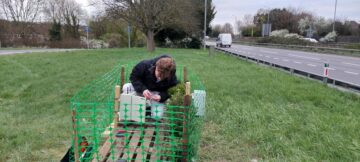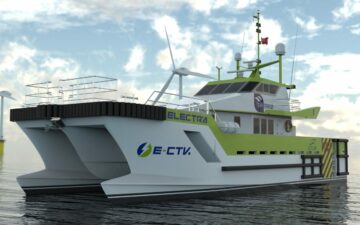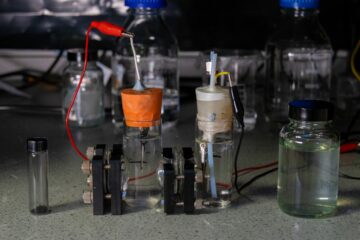

Scientists at the University of Aberdeen are developing technology that they say will enable electricity generated by renewables to be ‘banked’ as green hydrogen in depleted oil and gas reservoirs alongside industrial carbon emissions.
The group says the research could play a key role in helping Scotland achieve its net zero ambitions and even become a net exporter of hydrogen, while providing a new lease of life to depleted oil and gas reservoirs and aquifers, as well as the pipeline and well infrastructure surrounding them.
It could also reduce constraint payments made to windfarm operators to stop generating electricity when production is too high, by allowing the excess electricity to be converted to green hydrogen and stored for use elsewhere. A recent independent report to the UK Government has highlighted issues around the ability of the National Grid to cope with increased power generation as more renewables projects come on stream, underlining the potential benefits of the current research in easing pressure on the grid. Furthermore, the Scottish Government-funded Hydrogen Backbone Link project has underlined the important role that hydrogen could play in Scotland’s ambitions to become a net exporter of green energy.
Dr Prashant Jadhawar from the University’s School of Engineering is leading the projects which have received support from the Net Zero Technology Centre’s (NZTC) Net Zero R&D Programme which is funded by the Scottish Government, Scottish Funding Council and Scottish Enterprise, and is backed by a range of industrial partners including a number of UKCS North Sea Operators, Scottish Gas Network Plc, BatiGea Ltd., UK Elixir consultants Ltd., UK, and Flow Expertise Ltd., UK.
Dr Jadhawar will present his research at the Offshore Europe conference taking place this week in Aberdeen, where he is presenting at the conference’s Technical Session on Hydrogen Challenges taking place tomorrow (Thursday, 7 September) from 10am. He will then give a further talk on the University of Aberdeen’s stand (2E68) at 1pm.
The first phase of these projects which is already underway uses a combination of modelling, simulation and laboratory experimentation to evaluate the most effective means of transporting hydrogen through the onshore and offshore North Sea pipeline network, with the aim of developing digital tools that will enable transportation to homes and businesses.
It is also investigating the co-storage of hydrogen and carbon dioxide in depleted hydrocarbon reservoirs and aquifers, with CO2 acting as a ‘cushion’ gas. This technique has never been attempted before but could be used to store blue hydrogen and the associated CO2 at a large scale.
Meanwhile, the second phase will focus on field trials and commercialisation through the potential formation of a spin-out company to drive forward the technology.
Dr Jadhawar said that the development of these technologies is a potential “game-changer” which could play a major role in helping Scotland meet its target of 5GW of green and low-carbon hydrogen production (equivalent to a sixth of the country’s energy needs) by 2030.
“This target relies on there being sufficient hydrogen storage capacity which only subsurface geological formations such as depleted hydrocarbon reservoirs or aquifers can deliver on such a large TeraWatt (TWh) scale,” he explained.
“Through our current research we have estimated up to a 20 TWh hydrogen storage capacity, as well as the permanent sequestration of 50 million tons (Mton) of CO2 in a single UKCS reservoir investigated so far.
“By offering the safe and effective storage of bulk quantities of hydrogen and CO2, our project offers a unique opportunity to help Scotland meet its hydrogen production targets as well as offering the potential for Scotland to become a net exporter of hydrogen.
“It will also help extend the life of depleted oil and gas reservoirs and associated infrastructure, helping ensure a continued and important role for the North Sea in the net zero economy.”
Ekua Osei, Project Engineer at NZTC said, “We’re excited to see innovation playing a key role in enabling and enhancing Scotland’s hydrogen production, storage and export capability. This project could evolve current practices and allow electricity from wind farms to be stored rather than production being halted.
“As we transition from a legacy energy source to new vectors and more sustainable sources, it’s important that we do so in an environmentally conscious way, whilst reusing and repurposing the existing transportation pipelines and reservoirs. These projects at the University of Aberdeen align with this.”
- SEO Powered Content & PR Distribution. Get Amplified Today.
- PlatoData.Network Vertical Generative Ai. Empower Yourself. Access Here.
- PlatoAiStream. Web3 Intelligence. Knowledge Amplified. Access Here.
- PlatoESG. Automotive / EVs, Carbon, CleanTech, Energy, Environment, Solar, Waste Management. Access Here.
- PlatoHealth. Biotech and Clinical Trials Intelligence. Access Here.
- ChartPrime. Elevate your Trading Game with ChartPrime. Access Here.
- BlockOffsets. Modernizing Environmental Offset Ownership. Access Here.
- Source: https://envirotecmagazine.com/2023/09/13/hydrogen-bank-could-see-production-advantage-for-scotland/
- :has
- :is
- :where
- $UP
- 20
- 2030
- 50
- 7
- a
- ability
- Achieve
- acting
- ADvantage
- aim
- align
- allow
- Allowing
- alongside
- already
- also
- ambitions
- an
- and
- ARE
- around
- AS
- associated
- At
- attempted
- Backbone
- backed
- BE
- become
- been
- before
- being
- benefits
- Blue
- businesses
- but
- by
- CAN
- capability
- Capacity
- carbon
- carbon dioxide
- carbon emissions
- challenges
- co2
- combination
- come
- commercialisation
- company
- Conference
- conscious
- consultants
- content
- continued
- converted
- could
- Council
- country’s
- Current
- deliver
- developing
- Development
- digital
- do
- drive
- easing
- economy
- Effective
- electricity
- elsewhere
- Emissions
- enable
- enabling
- energy
- engineer
- Engineering
- enhancing
- ensure
- Enterprise
- environmentally
- Envirotec
- Equivalent
- estimated
- Europe
- evaluate
- Even
- evolve
- excess
- excited
- existing
- expertise
- explained
- export
- extend
- far
- Farms
- field
- First
- flow
- Focus
- For
- formation
- Forward
- from
- funded
- funding
- further
- Furthermore
- GAS
- generated
- generating
- generation
- Give
- Government
- Green
- green energy
- Grid
- Group
- Have
- he
- help
- helping
- High
- Highlighted
- his
- Homes
- HTTPS
- hydrogen
- image
- important
- in
- Including
- increased
- independent
- industrial
- Infrastructure
- Innovation
- investigating
- issues
- ITS
- jpg
- Key
- laboratory
- large
- leading
- Legacy
- Life
- LINK
- low-carbon
- Ltd
- made
- major
- means
- Meet
- million
- modelling
- more
- most
- National
- needs
- net
- network
- never
- New
- North
- North Sea
- number
- of
- offering
- Offers
- Oil
- Oil and Gas
- on
- only
- operators
- Opportunity
- or
- our
- partners
- payments
- permanent
- phase
- pipeline
- Place
- plato
- Plato Data Intelligence
- PlatoData
- Play
- playing
- PLC
- potential
- power
- practices
- present
- pressure
- Production
- programme
- project
- projects
- providing
- R&D
- range
- rather
- received
- recent
- reduce
- Renewables
- report
- research
- Role
- safe
- Said
- say
- says
- Scale
- School
- School of Engineering
- Scotland
- SEA
- Second
- see
- September
- sequestration
- session
- simulation
- single
- sixth
- So
- so Far
- Source
- Sources
- stand
- Stop
- storage
- store
- stored
- stream
- such
- sufficient
- support
- Surrounding
- sustainable
- taking
- Talk
- Target
- targets
- Technical
- Technologies
- Technology
- than
- that
- The
- The Projects
- the UK
- Them
- then
- There.
- These
- they
- this
- this week
- Through
- thursday
- to
- tomorrow
- tons
- too
- tools
- transition
- transportation
- transporting
- trials
- Uk
- UK government
- underlined
- Underway
- unique
- university
- use
- used
- uses
- Way..
- we
- week
- WELL
- when
- which
- while
- Whilst
- will
- wind
- wind farms
- with
- zephyrnet
- zero








